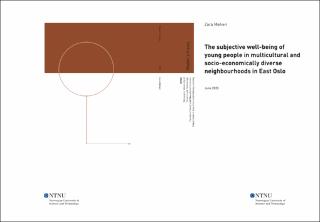The subjective well-being of young people in multicultural and socio economically diverse neighbourhoods in East Oslo
Master thesis
Permanent lenke
https://hdl.handle.net/11250/2784659Utgivelsesdato
2020Metadata
Vis full innførselSamlinger
Sammendrag
Formålet med dette studiet er å undersøke ungdoms subjektive trivsel i multikulturelle og sosioøkonomiske mangfoldige nabolag i Oslo øst. Målene for dette studiet er å utforske hvordan ungdoms subjektive trivsel manifesterer seg i deres hverdag, undersøke de strukturelle prosessene i nabolaget som påvirker deres subjektive trivsel og identifisere noen ideer for endring i politikk og praksis hos lokale aktører som har en interesse i ungdommenes subjektive trivsel. Ungdom med multikulturelle bakgrunn mellom 15 og 18 år gammel er hoved deltagere i dette studie, i tillegg til voksne som jobber tett med ungdommer, som miljøveiledere. Metodikken i dette studiet tar en flermetodisk tilnærming trekket fra deltagende feltarbeid i en ungdomsklubb øst i Oslo. Dette studiet er inspirert av en handlingsorientert tilnærming for å oppfylle det tredje målet om å identifisere ideer for endring i politikk og praksis hos lokale aktører. I hverdagen er ungdommenes subjektive trivsel et speilbilde av deres forhold til ulike steder, for eksempel skole og ungdomsklubber, hvordan de navigere gode og dårlig trivsel, for eksempel gjennom fritidsaktiviteter eller ulovlige aktiviteter, og deres forhold til jevnaldrende og voksne. Strukturelle prosesser i nabolaget har marginalisert ungdommer, blant annet gjennom nyliberale boligpolitikk og gentrifisering. Ungdommer opplever at strukturelle prosesser, inkludert revitalisering av nabolaget, har ikke imøtekommet deres behov, ønsker og bekymringer. Det ungdommer ønsker fra lokale aktører er å bli sett, hørt og tatt på alvor. Dette studiet argumentere at ungdoms subjektive trivsel er en relasjonell konstruksjon som gjenspeiler deres perspektiver, følelser og opplevelser i forhold til andre mennesker, steder, institusjoner og materielle forhold.
Nøkkelord: ungdommer, subjektiv trivsel, mangfoldige nabolag, Oslo øst The purpose of this research is to explore the subjective well-being of young people in multicultural and socio-economically diverse neighbourhoods in East Oslo. The objectives are to explore how the subjective well-being of young people is manifested in their everyday lives, examine the structural processes in the neighbourhood that affect their subjective well-being, and identify some ideas for policy and practice change in local stakeholders. Young people between the ages of 15- and 18-year-olds of multicultural backgrounds are the primary participants of this research, in addition to adults, including youth workers, who work closely with young people. The methodology of this research takes a multi-method approach drawn by participatory fieldwork in a youth club East Oslo. The research is inspired by an action-oriented approach to fulfill the third objective of identifying ideas for practice and policy change in local stakeholders. In their everyday lives, young people´s subjective well-being is a reflection of their relationships with different places, such as schools and youth clubs, the different ways of navigating well-being and ill-being, for example through leisure activities and delinquency, and their relationship with peers and adults. Structural processes in the neighbourhood have marginalized young people, for example through neo-liberal housing policies and gentrification. Young people feel that structural processes, including the revitalization of their neighbourhood, have failed to cater to their needs, wishes, and concerns. What young people want from local stakeholders is to be seen, heard, and taken seriously. This study argues that young people´s subjective well-being is a relational construct that reflects their views, feelings, and experiences in relation to other people, places, institutions, and material conditions.
Keywords: young people, subjective well-being, diverse neighbourhoods, East Oslo
